Roses are undeniably the queens of the garden. Roses effortlessly elevate any outdoor space with their lush, captivating blooms, delightful fragrances, and vibrant colors. However, as magnificent as roses are, they tend to attract pests and diseases, posing significant challenges to even the most experienced gardeners. While chemical pesticides may seem like a quick solution, many gardeners are now embracing natural remedies, prioritizing the health of their gardens, families, and the planet. Let’s explore practical, sustainable ways to manage common rose diseases naturally so your roses remain vibrant and disease-free.
Common Rose Diseases
Black Spots(Diplocarpon rosae)
Black spots disease, recognized by its distinctive appearance, manifests as dark, circular spots with fringed, yellow edges on rose leaves. Severe infections lead to leaf drop, weakening the plant and diminishing its blooming potential.
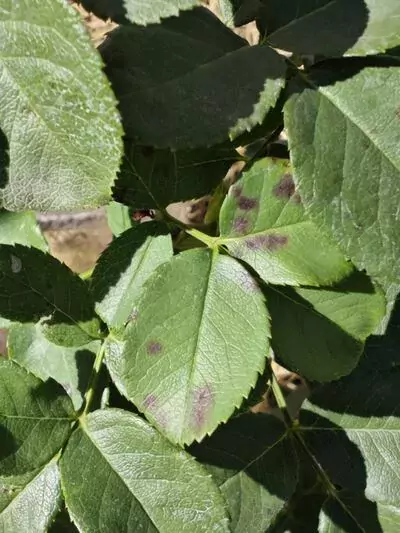
Natural Treatment:
Neem Oil Spray: Neem oil, derived from the neem tree, possesses excellent antifungal and insecticidal properties. Dilute one tablespoon of neem oil in one quart of water, add a teaspoon of mild organic liquid soap, and spray weekly on your roses. The soap acts as an emulsifier, helping the oil adhere better to leaves.
DIY Garlic Spray: Garlic, an antifungal powerhouse, is perfect for combatting black spots. Crush 10 garlic cloves and soak them overnight in one quart of water. The following day, strain this potent mixture and spray it onto your roses weekly. Garlic spray is particularly effective during damp conditions when fungal growth is prevalent.
Garden tips
Apply organic treatments once a week as a preventive measure to effectively protect your plants. Spray leaves early in the morning or during cloudy conditions to prevent leaf burn. Keeping diseases at bay through proactive care is always better than managing them afterward.
Powdery Mildew
Powdery mildew announces through a telltale white, powdery coating that blankets leaves, stems, and buds. Besides being aesthetically displeasing, it restricts photosynthesis, stunting growth and flowering.

Natural Treatment:
Baking Soda Solution: A simple yet highly effective remedy, baking soda alters the pH level on leaf surfaces, making them inhospitable for mildew. Mix one tablespoon of baking soda and a teaspoon of mild liquid soap in one quart of water. Apply generously every five to seven days, particularly after rainy periods.
My favorite!
Boost your roses’ health naturally with this easy and effective garden tip: mix 1 part whey with 5 liters of water and spray directly onto the leaves once a week. This simple organic solution is an exceptional preventative against powdery mildew, protecting your roses from fungal infections. Additionally, whey is rich in beneficial nutrients and amino acids, enhancing your roses’ overall immunity and serving as a gentle yet powerful fertilizer. Regular use lets you enjoy more vigorous plants and vibrant blooms while keeping your garden chemical-free!
Garden tips
Improving Air Circulation: Roses flourish when air freely circulates through their foliage. Prune your plants judiciously, removing congested growth to promote airflow and sunlight penetration. Avoid overhead watering to prevent prolonged leaf moisture, a primary factor in mildew development.
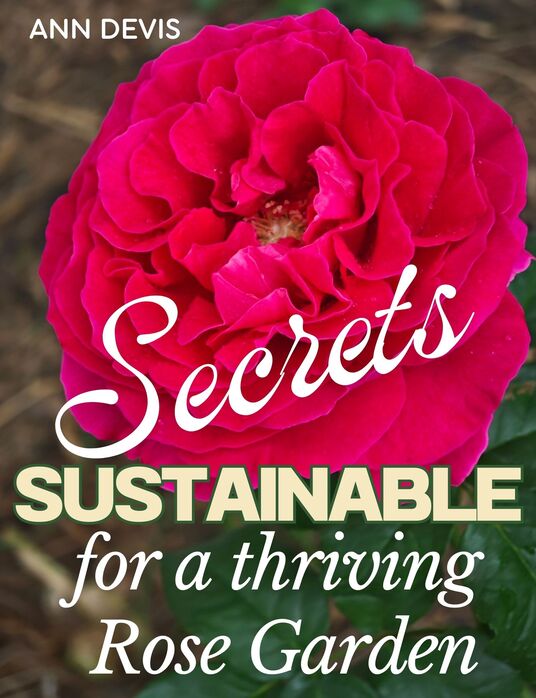
The Organic Rose Revolution: Grow Stunning Blooms, Naturally
- Unlock the secrets of nurturing your roses organically with our guidance on soil health, natural fertilizers, and sustainable pest control methods. Your garden will thrive with eco-friendly care that respects nature’s balance.
- Empower yourself with the knowledge to craft natural remedies for common rose ailments.
- Banish pests from your garden precisely using proven strategies that safeguard your roses without harsh chemicals. Keep aphids, mites, and other invaders at bay while preserving your garden’s natural harmony.
- Explore a world of breathtaking rose varieties carefully curated to captivate your senses and elevate your garden to new heights of beauty.
Rust (Phragmidium spp.) on roses
Rust manifests as rust-colored, powdery pustules predominantly under leaves, often accompanied by yellow spotting on upper surfaces. Left untreated, rust can significantly weaken the plant, producing poor bloom.
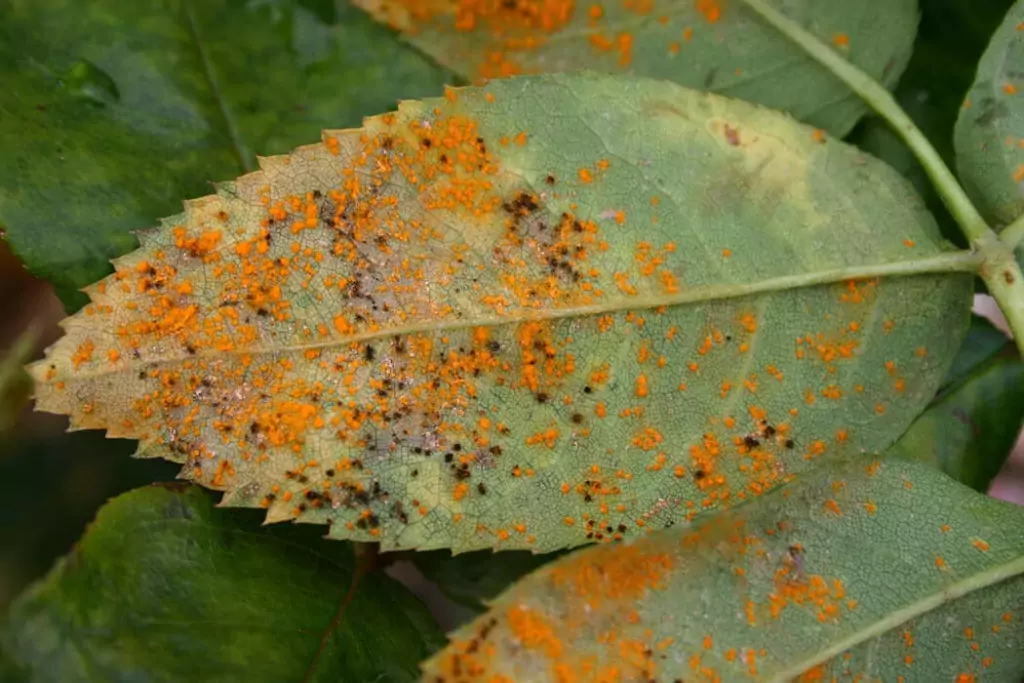
Natural Treatment:
Vinegar Spray: Vinegar’s acidity effectively combats rust. Prepare a mixture using three tablespoons of apple cider vinegar in one gallon of water. Spray weekly, thoroughly coating both sides of the leaves, particularly focusing on the undersides where spores proliferate.

Get Your Free Lunar Gardener's Calendar 2025!
Join the Lunar Gardening Revolution! Subscribe now to receive our exclusive Free Lunar Gardener’s Calendar for 2025. Harness the power of the moon to optimize your planting, nurturing, and harvesting.
Botrytis Blight (Gray Mold)
Identified by fuzzy, gray mold enveloping rosebuds and petals, botrytis blight often occurs in humid, wet conditions. It rapidly spoils blooms, leaving gardeners frustrated by unsightly, wilted flowers.
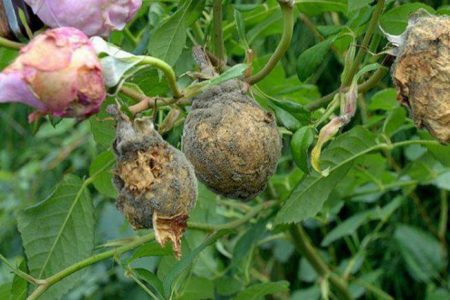
Natural Treatment:
Chamomile Tea Spray: Chamomile tea, with gentle yet powerful antifungal properties, is an excellent natural remedy. Brew strong chamomile tea and let it cool. Spray directly onto affected rosebuds and petals, repeating weekly to control outbreaks.
Your Highly Effective All-Natural Rose Disease Spray Recipe
For gardeners seeking an all-in-one solution, here’s an easy-to-make, powerful, and safe spray:
Ultimate Rose Defender Spray Ingredients:
- 1 tablespoon baking soda
- 1 tablespoon neem oil
- 1 teaspoon mild organic liquid soap (like castile soap)
- 1-quart warm water
- Optional: 2 drops of peppermint essential oil
Instructions:
- Dissolve baking soda in warm water in a spray bottle.
- Add neem oil and liquid soap, shaking vigorously to blend thoroughly.
- Add peppermint oil for enhanced insect deterrence if desired.
- Spray generously on leaves weekly, covering both upper and lower leaf surfaces.
Necessary: Always perform a spot test to ensure your plants don’t experience any adverse reactions.
Preventive Care: The Best Natural Defense!
Prevention is indeed better than cure. Proactive gardening practices significantly reduce the likelihood of diseases taking hold:
- Select Disease-Resistant Varieties: Choose rose cultivars bred explicitly for disease resistance. Varieties like Knock Out roses, Rosa rugosa, and Hybrid Musk roses naturally resist many common diseases.
- Pruning and Air Circulation: Regular pruning boosts air circulation, reduces humidity, and enhances sun exposure. Remove weak or crossing branches and clear debris promptly.
- Innovative Watering Practices: Water your roses at the base, avoiding foliage. Early morning watering allows leaves to dry quickly, further reducing disease risk.
- Mulching: Apply a layer of organic mulch, such as composted bark or leaf mold, around rose bases. Mulch prevents soil-borne pathogens from splashing onto leaves, regulates soil moisture, and improves soil health.
- Organic Fertilization: Regularly feed roses with organic fertilizers like compost, worm castings, or seaweed extract. Healthy roses, nourished naturally, are more resilient against diseases.
Organic Companion Plants: Nature's Garden Allies
Integrating companion plants into your garden boosts rose health significantly:
- Garlic and Chives: Their strong scent repels fungal diseases and pests. Plant around your roses as natural protective barriers.
- Lavender and Sage: Both plants deter pests like aphids and moths, enhancing overall garden protection. Plus, their attractive blooms complement roses beautifully.
- Marigolds: Marigolds repel nematodes and aphids and enhance soil health, benefiting nearby roses.
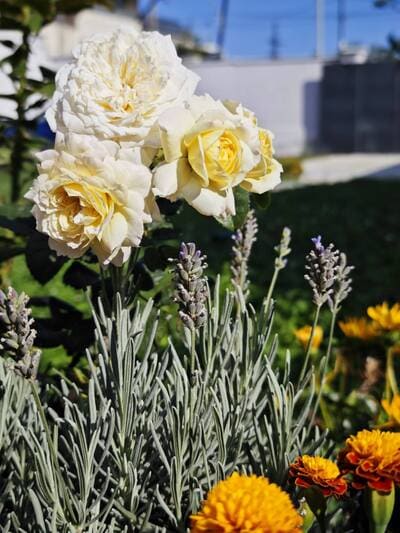
Enhancing Soil Health Naturally
Healthy soil supports robust, disease-resistant roses. Amend your soil regularly with organic matter like compost, aged manure, or leaf mold. Beneficial microbes in organic amendments boost soil vitality and plant resilience, naturally suppressing pathogens.
My favorite soil improver is aerated compost tea, based on a recipe by Elaine Ingham.
Prevention matters
First of all, I recommend paying attention to roses that were sick last year. Some like to get sick with this or that disease – it depends on the variety. However, if you know that the rose was sick last season, it definitely needs disease prevention. The path of an organic garden is different from the traditional gardening we are used to seeing around us (for me, this is a dead end). Therefore, I choose organic plant care products. Please take a closer look at your plants; you will see that they need help before they get sick. For example, did you know that aphids do not attack plants with strong immunity? If you notice uninvited guests, such as aphids, the rose’s immunity is reduced, and it needs your help first. It is necessary to do disease prevention. Wash off the aphids with water or use any of the products listed in this article. You do not need chemicals in this case.
Frequently Asked Questions
The white powdery substance is mildew, a fungal disease that thrives in humid conditions, poor airflow, and shaded areas.
Neem oil should be applied weekly as a preventive measure, especially during wet or humid conditions. Spray thoroughly on both sides of the leaves early in the morning or late afternoon to avoid leaf burns.
Enhance your roses’ immunity naturally using organic fertilizers like compost, worm castings, and seaweed extract. Additionally, spraying diluted whey on leaves weekly strengthens their natural resistance to fungal infections.
Yes, regular preventive treatments with organic sprays like neem oil, garlic solutions, baking soda mixtures, and good gardening practices (proper pruning, watering, and companion planting) can effectively manage rose diseases without chemical pesticides.
Yes, chamomile tea has antifungal properties, making it effective against fungal diseases like botrytis blight (gray mold). Regularly spraying cooled chamomile tea onto affected areas can help control and prevent outbreaks.
Final Thoughts
Embracing natural remedies and preventive care practices transforms your rose garden into an oasis of health and beauty. You protect your roses, safeguard the environment, and foster a vibrant, sustainable garden ecosystem. With dedication, knowledge, and these practical strategies, you’ll cultivate roses that captivate and thrive naturally, season after season.
Want more gardening tips? Subscribe to our newsletter for monthly advice straight to your inbox!


